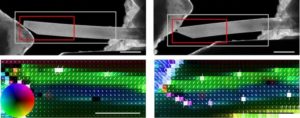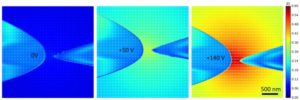Mingjian Wu
Dr. Mingjian Wu
Project description
Probing nanometer scale electrostatic (Coulomb) potential and/or the corresponding electric field, and establishing structure- properties relationships at this length scale in advanced functional materials are not only of fundamental interest but also of technological relevance and importance, especially for materials with application in the ever miniaturizing and integrating electronics. Electrostatic potential, as pure phase object, can only be “seen” by the phase of probing radiation/particle wave. Transmission electron microscopy (TEM) based phase contrast and holography methods are the most suit- able, if not the only, tools for this purpose. Out of many forms electron holography, off-axis and in-line electron holography in the TEM are the most popular and successfully implemented techniques for certain applications. However, both methods show limitation for many applications especially with the scope to extend to combine with in-situ studies. Differential phase contrast (DPC) using electrons based on scanning TEM (STEM) shows high potential to complement the abovementioned more traditional methods. As a diffraction based method, the evaluation of the beam disks (micro-diffraction) is indispensable for the qualitative and quantitative interpretation of DPC data. In addition, we expect to reveal more information about beam-specimen interaction from the micro-diffraction patterns. In this project, we work on the development and application of DPC and micro-diffraction mapping to probe the dynamics of electric fields and electrostatic potentials at nanometer scale.
 Fig. 1. Electron beam deflection measured at a bending GaN nanowire.
Fig. 1. Electron beam deflection measured at a bending GaN nanowire.
 Fig. 2. Electric field between two metal tips.
Fig. 2. Electric field between two metal tips.
References
[1] M. Wu, E. Spiecker, Ultramicroscopy 177 (2017) 1-13.

